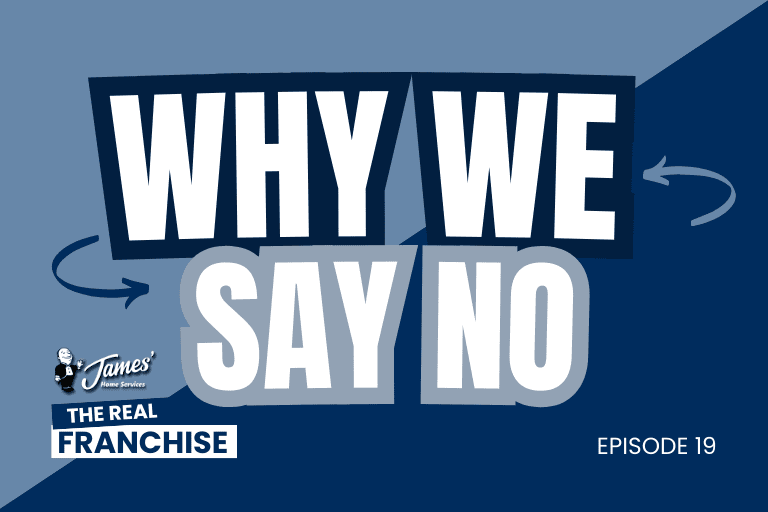Rhiannon
Hello, and welcome to The Real Franchise, a video series designed to deliver real information, real answers, and real insights into franchising. This series is brought to you by James Home Services Australia. I’m the CEO and Justin is one of our owners and our head of new businesses.
Together we’re going to tackle all of the big topics unscripted, unplanned and unfiltered. No sales, no fluff. We’re just going to give you the information straight up. Today’s topic is all about why we say no. Justin. We receive sometimes in excess of 400 inquiries a month. And what I mean by that is people are getting in touch with us saying, hey, I’m interested in joining.
We’d like some information. Where do we go from here? More than 400 a month. What happens to those 400 inquiries?
Justin
Question. And when we raise this to do a topic on this site, I thought, well this is not something that franchisors would normally talk about because you know we don’t say no, we want everyone. But the reality is we’ve learned this isn’t right for everyone. And what I love about that process and we’ve talked about this in previous ones, is we take people through an information process so that they can find out what it’s about.
And we’ve learned a lot, you know, under our subscription model, we have started so many new businesses and we’ve learned lots about the sorts of characteristics, I guess you could say, and some of the basic foundational things that we need people to have in order for them to be successful. So I guess simple answer to your question why do we say no?
I think one, ethically, we have a very strong responsibility to do the right thing by people and that sort of drives. And I know for yourself as well, right. And that drives our decision making processes. And, the even the way we’ve revolutionized our coaching recently and all those sorts of processes, the marketing we do when people start, it’s all about ethically doing everything we possibly can to help people succeed.
And we’ve let you know that there’s certain traits and things that if people don’t have, it’s highly unlikely for them to succeed. You know, it’s not that we don’t want to give people a chance. It’s just that, as an example, you know, our entire system runs on computers. You know, we’ve spent and we’ve talked about previously over $300,000 on our Salesforce system that we call The Butler that people use.
So if people can’t use a computer, it’s a real hurdle in front of them before they get to the pressures of starting and trying to grow a new business. You.
Rhiannon
And there’s a big difference between can’t use a computer and can’t use one and doesn’t have the willingness to learn. And I’m I think we should circle back to that point because, yes, there’s a real difference between do we need you to have all the skills or do actually, we just need you to have a willingness to work with us and to learn new things.
And it’s the willingness we look for. I’d like to take that concept and come back to it, because I’d like to go back to something, that you said right at the outset and that acknowledgment that there are 400 inquiries that come in. So what kind of what happens to those people? Obviously, we’ve spoken in previous videos that you contact every single one of those people.
What happens to them whether they end up because we don’t we don’t start 400 new businesses in our network every single month. So something happens to all of those inquiries. What’s the kind of breakdown?
Justin
Yep. I would say a third, at least a third of the people I simply can’t get in contact with. Let people physically launch an inquiry. Sometimes I put in like a fake email address and phone number, and it’s like, if you wanted information, we can’t send you information either way, you know? So for whatever reason, probably a third of people I can’t get in contact with if I have a valid email address, at the very least, you know, or send them a full information kit.
So they’ve got all the information like, you know, I can come back to me once I’ve gone through it. About a third, once we have that initial discussion, that is, they discovered like a select themselves. And, you know, this isn’t the sort of business model that they’re looking for. You know, I get a lot of people that for example, want a business that they don’t.
To me, it’s they want the perfect business. You know, they want to just be able to walk in and, and have a group of staff that do all the hard work, and they sit back and just manage it. All right. And the challenge is it’s impossible. I think in pretty much any business, unless you’re going to get a heck of a lot of money and buy a big established business, any new business, you have to start it.
And that’s once people realize, oh, what? I have to give up my job and I have to commence this business and I have to build it for a lot of people that’s like, oh no, that’s not what I want to do. And so I would say third.
Rhiannon
You know, they to get there that have teams of stuff. But what you’re writing is that, it’s most effective when you come into our network to come in with the understanding that the first 6 to 12 months are going to be you on the ground, running the business, doing the work, doing the marketing, booking the jobs, quoting the jobs, delivering the quotes, winning the work and doing the work and invoicing you all that whole process.
For the first 6 to 12 months, we’ve had businesses that have expedited that. Nothing’s impossible, but realistic, clear. You do need to come in with the understanding that it’s going to be you for the first period of time, it’s going to be you. And if you’re not prepared for that, then our model doesn’t necessarily suit that. Go.
Justin
Yes that’s right. And then the remaining cohort of people in that will be a group of people that, might not have the basic requirements, you know, they might have a criminal history, you know, and we do a lot of work with various organizations. And I have to sign for an hour now. It’s like 15 different statutory declarations with different organizations to say that we hold a current clean place check for everybody.
That’s part of our neighborhood. So, you know, if someone’s got a police check, that’s already a criminal history. Well, I just we just can’t, give them.
Rhiannon
A judgment thing. It’s not a passing judgment. And a lot of people, you know, will say, hey, look, it was 20 years ago. I was a young kid, and I made a really dumb mistake. And you know what? We don’t judge for that. It’s no shade. You know what? What some what what what somebody past is doesn’t necessarily determine what their future is.
So it’s not a passing judgment. It is purely a practical thing. It’s our brand. And our reputation is built on that very publicly outward statement of, you know, all of our business owners and their staff do have a clean place check. It’s part of our branding. It’s part of the representation that we make to market about trustworthiness and credibility.
So yeah, it’s not a judgment thing. It’s just it’s our choice. That’s how we brand the company. And that is a demand from an awful lot of the clients at a large corporate scale that we work with as well.
Justin
Absolutely. So I think, you know, this those sort of fundamental little foundational things that that knock some people out and then out of the remaining cohort, you said, really, one of the biggest things we’re looking for is an attitude to learn. You know, because all of us, myself included, you know, we’re still learning every day and we’ve learned lots, and our whole entire business system is about passing on that learning.
And there’s heaps to learn, you know, I know I was very arrogant when I first went through that process and was looking at potentially joining James. This is back in 2009. And, you know, I thought how hard you’re going to guard business speak. That was my literal words to the owner of the company back then. And yeah, no, I have people say that to me now and it’s like, well, yeah, the physical job itself is physically demanding, but but not difficult after a bit of training.
But you’re running a business and you know, your, you know, it’s you’ve got to market or have someone marketing for you. You’ve got to know all these different processes and how to win quotes and doing quotes and, and servicing clients efficiently. And it’s all that sort of willingness to learn, physical abilities. Another thing that we all get, you know, you got to be these are particularly in that cleaning business and lawn and garden kids, very physically demanding jobs.
So, you know, we do have some people that are recovering from some massive major health dramas and, and don’t want to get back to their old job, want to do a business like this, will, you know, if you’ve just had spinal reconstruction? A lawn and garden business isn’t probably the right thing to do. So it’s those sort of things that select people.
And do we get down to that? We talked about previously that 2% club where, you know, the people that came willing to learn, have a clean place check and, yeah. And that’s the people that sort of make it through that process. Three out of the 400. So. Right. Narrows down. Yeah.
Rhiannon
So we’ve got we kind of have got a Sarah. Sarah said a third or I’m contactable a third after the initial call with you or the initial information session, make the decision themselves that this isn’t the right fit. And that’s totally fine. There’s no there’s no pressure in our process. And we never begrudge doing an information session or having a call with someone if it doesn’t go anywhere.
Because I had an interest, I wanted information, and so we gave it to them, and we empower them to make a decision that felt right for them at the time. So we’ve got a third that select that. We’ve also got another third that do continue into our information process. And out of that third, only 2% at the end generally end up onboarding into our network.
So where is the other 31%? The other 31%? If we’re really honest, we’re saying no to they, willingly entering into our information process. And at a point through that process, they are either selecting themselves out through that process or we are saying no to them. So that’s a huge percentage. Let’s talk about some of the reasons that we say no, because these are people that have entered into the information process.
So they’re interested, they have a willingness, they have a want. So why are we saying no to those that pretty significant percentage of people.
Justin
We’re getting to the pointy end of the stick, man.
Rhiannon
Yeah, that’s what this series is all about. You knew these questions were coming.
Justin
Yeah. And this is where it does get we have to make some judgment calls. I’ll give some examples. Just thinking of recent people that I’ve had to say no to mental health. You know, people who, I had one individual recently had been off work for about 12 months because of serious mental health issues. Getting back on his feet and, is showing all the right signs, but in his own words.
So this one is, being able to be out in society, you know, and, starting a new business from scratch is difficult on anybody’s mental health. And so my advice to him was, it’s a bit too soon for the runs on the board. Get back into society, settle in. So, you know, we’ve got a meeting booked with him to meet mid-February.
It’s in the calendar. I just said, all right. It’s not a no forever. It’s just a no. Now is not the right time for you. And so we’ll catch up again. At least you, and see how he’s going. I said, this is quite a few people that I have that, relationship breakdowns. Number one, because of the pressures of a new business, if someone’s we’ve had, I’ve had quite a few people just coming out of serious, you know, marriage breakdown or relationship breakdown and a bit of a mess.
Had to quit their job because I couldn’t hold it together, of their own admission. And they want to do their own business once again. It’s it’s it’s not married forever. It’s just like, mentally you need to get things sorted a bit more before you jump into your own business, because there’s a lot of pressure in, you know, in business.
And we don’t want to create the spiral further because of that pressure. So it’s these sorts of things. Another big a must have, another big one. So our subscription model people only need $2,000 upfront. So, you know, pretty much anyone could go, yes, I can do I can join the challenges. And I explained to people is, yes, it’s only a thousand upfront.
That’s all you have to pay jacks. But this for example, there’s two, two weeks of training. And in those two weeks of training before we it’s full time. You’re not earning any money. Your first week is sort of in like a classroom. Second week you’re working in a business with somebody learning all the ropes. So there’s two weeks of no income.
Then you get back to home and then you’re commencing your business. And yeah, we hope week one, you know, the customers roll in. But realistically it could be a couple of weeks before the income starts happening. So you need to have cash reserves I think, you know not not to pay extra coin to James or anything, but to leave and to pay the rent and pay puts the fuel in the car and all that sort of stuff for, you know, I look at at least 5 to 10 weeks of income to cover, so, you know, if someone comes that has but no savings, once again, I would be saying, well, no, for now, let’s
work on a savings plan. And, and I’ve got quite a few people that we’re catching up with every few months until they get to a point where they’ve got that cash reserve because, you know, most of them have young families and responsibilities. And the last thing we want to see is someone all excited to start a business, but just simply don’t have that, you know, if it’s not an instant start, then it’s just, it just makes it too difficult.
Rhiannon
Yeah. And we actually have a calculator for this. We, you know, we we gather information also of inquiries throughout the process and when and when we get to a point that both parties do want to progress, we do ask for an application. And part of the application is providing to us information about your assets, annual liabilities and also about your personal budget.
And and the sole reason that we do that is to to actually take a really pragmatic approach to saying, how long can you survive without an income? And then we look at, you know, we look at the data of how long it takes our businesses to get started to a point where they’re earning the sort of income that you would need in order to cover your, your lifestyle expenses.
And we make a calculation as to how long could this person survive in our network if, worst case scenario, the business was quite slow to get going. And so it’s not you or me making a judgment call about someone’s financial capacity. We have a calculator that says, hey, this person doesn’t have the capital to be able to give the business their full time focus and continue to pay all of their rent or their mortgage or their food or their utilities.
And the last thing we want to do is put someone under undue stress and pressure, particularly financially. And I just don’t think that it’s responsible for us to offer a franchise business to someone who can’t continue to pay their bills until we are relatively confident that then, following our system, has resulted in a business that is returning some income to them.
So it’s not a judgment, it’s a calculation. It’s based on data that people provide to us. So, you know, we are reliant on accuracy and in information that comes to us, but it helps us to take, you know, judgment calls out of it, and it helps us also to sit down with someone. I mean, every now and then you’ll tell me that you’ve had to sit down with someone after getting their financial information and running it through our calculator.
And it turns out that they really can’t afford to pay their bills for very long without a steady income coming in. And so, you know, you’ve had to sit down with them and had that have that really tough conversation and say, look, it’s not a no forever. But right now it’s not a responsible thing for you to do.
You need to go and save X amount of dollars and then and then come back to us. If if you have a continuing interest and it’s often that you’re telling me that that person is is thanking you for being so honest and transparent with them.
Justin
Yeah, yeah. And it is very disappointing. What for? For them and for me, you know, because by the time we get to that point, very excited to have them as part of the network. But, you know, ethically it’s just not the right thing to do if someone’s not caught because it’s one of the let’s be honest. And it’s one of the things that we’ve learned, we’ve seen where, you know, we’ve developed this tool and developed the numbers around this because of experience and and sadly, early on, because the beauty of this subscription model is that pretty much anyone can get a go, you have a stop.
But that’s not always the right thing or the right time. And so there is we do have to make these sort of judgment calls with people. But once again, it really comes back. I think for me the biggest single thing is, is attitude. And, you know, like we’re circling back to that computer, come in. We’ve got a great, as you know, a great family in, Victoria that joined us.
And you know, he he had was very, in his own words, computer not literate but you know, as a family that work through that. You know, he’s growing a great business doing an awesome job and and they’re making it work. And that was really because that attitude to learn was there. Like, I can remember before we approved him, he’d let me know how he’d signed up to an online.
So we have.
Rhiannon
We have someone joining us.
Justin
Yes. An extra like an online type because, I mean, he’s learning to type and every time I’ve made him, it’s telling me how much he’s up. Words per minute of typing had increased and these sorts of things. So, you know, that said a lot to me. Yeah, that if someone’s prepared to go to that length. Yeah, that will mirror across other areas of learning.
Yeah. So yeah.
Rhiannon
That’s a very nice segway into coming back to the conversation. We talked initially, which was one around willingness and skill and something that we’ve observed over the last 12 or 18 months specifically is, that we can think of willingness and skill on in like four quadrants and skill is this one running horizontally, you know, and one and like loads of skill could do this with their eyes closed and their hands tied behind their back.
And then the other end of this is that they have limited skill when it comes to operating a business. And then you have this axis here, which is willingness. And down the bottom you have a very low willingness to work with us, to work to a system, to follow guidance, to implement feedback, and to correspond professionally with your business coach.
And then up the top of this willingness axis, you have somebody who is very driven and motivated to work with us, to work to our system, to receive feedback, to implement. And they have a really positive attitude to if it’s to be, it’s got to be meh. What we’ve learned is that if you fall below the low, this on willingness, if you have a low willingness to work with us and to work to a system, it’s very likely you will not succeed in a franchised network.
If you have low skill that is not a determinant of failure or hardship. If you have low skill, but you have high willingness, you can make it work because you’re willing to work with us. And that’s our role. Our role is to work with you. So we’ve learned this. We’ve learned that as long as someone comes in with a high willingness to work with us, to work to system, to follow guidelines and feedback and implement and be held accountable, then it doesn’t matter where their skills sit.
And that family that you’re talking about in Victoria is a prime example, because they came in with very low computer skill, but a high willingness to make it work nonetheless. And they have and it’s really impressive to say. And it’s so fulfilling for us to say, because we’ve really been able to actually help this family have the dream of their own business, whereas otherwise I just might not have had that.
I just maybe have one final question before we, wrap. And it’s kind of stating the obvious, which is we’re saying no to 30% of people that inquire, doesn’t that seem a little unfair?
Justin
It I guess it made it on a surface, but wouldn’t it be more unfair if we said yes and then it didn’t work out?
Rhiannon
Yeah.
Justin
Because that’s never nice. And, yeah, we we have one of our other sessions. We talked about a moral compass. And I very much, you know, as I said, putting a goal know for yourself as a CEO, the drive and what gets us up every morning is saying Aussie families have their own business and build their own financial success that they’ve created.
You know, it’s that’s what drives us. And we saying no, because we with the experience that we have and our network has, we feel that now is not the right time for that individual.
Rhiannon
That’s a really, it’s a really important question to have put on the table, because what I don’t want is people to watch this video and think, oh my goodness, these guys are so harsh. I want that other perspective in there of we’re not trying to grow a network for the sake of growth. We’re not trying to be the biggest, what we’re trying to grow is a network full of committed and successful business owners and we think that we are on the right track in identifying the recipe for people who are best suited to that environment and to that sort of success.
And so you’re absolutely right to deviate from that and to accept someone who, deep down, we know is going to have a really hard time in our network, that’s not the right thing to do. It might be right if the goal was to grow to be the size of you know, some of our competitors who are enormous, that they’ve grown significant holdings in the market.
But that’s not our choice, that’s not our strategy, and that’s not where we want to be. We’ve got a very different strategy to them. And it’s not to say their strategy is wrong, or that the quality of their service is no good. It’s just to say we choose to do things differently. And the reason that we say no to so many people is because, you know, we we want to make sure that the network that we’re growing is a really healthy one, that it’s sustainable and that it’s full of really successful businesses and and we know what we’re looking for.
We know we know what we need. We we need that willingness and we need that commitment and that drive and that determination. We can teach skill as long as that language is there. So that’s start with people and that’s what we know we need in order for somebody to come in and to have a really high possibility of making a business successful in our network.
Justin
Yeah. And and that’s what I encourage anyone who’s watching this, you know, if you’re sitting here going, well, I don’t feel confident or I don’t have much skill. So I was an employer. I would say, no, no, no, please take on board. Low skill is not what gives us side. No, it’s it’s the willingness factor. Yeah. But I get more concerned when people say, oh, you know, I know what I’m doing.
You know, I’ve got heaps of experience. So I know how to do this. That concerns me more than someone facing up and saying, hey, I’ve never had my own business. I’m really struggling. I want I’d like to, but I’m really scared. I like it. We shouldn’t be scared when we’re thinking of starting a new business, you know? That’s why you don’t have free choice.
You know, you got people to work through with you. The other thing I’d like to just add in here is it’s one of the things I love about our business model. Right. That particular end of the subscription for those watching, if you think of it, it’s a thousand upfront. We spend a lot of money in setting you up.
So we don’t make any money upfront, right? Every other franchise that you look at, they make a big part of their profit in the sale. So that puts the pressure on them to say, yes, yes, yes. Join us. Join, join, join. You know, because we’re going to make a chunk of money upfront and business models, not the.
So I feel ethically we can actually operate a lot better because yes, we’re not influenced by that. Yeah, we’ve got a sale. We’ve got all this money coming in to the bank. It’s not that at all. We we can say yes to people who we really feel will do well and I think if you’re watching this and you’re thinking about, please keep that in mind because you’re going to get, I think, a lot more honest, feedback and, and, and support then through another organization who really is I’ll describe it like you’re looking at the next chicken dinner.
You know what you could do? Here’s here’s someone that I could make some money out of. That’s not our approach at all.
Rhiannon
Not at all. We’re not motivated by that. That’s not how we operate. It’s not how we work. It’s not. We’re at the. Yours and my personal morals and ethics lie. And therefore, that’s not how we choose to lead this company in the direction that we’re taking it in. Which means that, yeah, we’re we’re far more selective and we’re always going to be much smaller.
But what we hope is that the quality of service and support that we’re offering is much higher. And also, you know, the quality of businesses that ultimately end up operating in our network are a lot higher. And their success is are a lot higher as well, because we’re getting that right fit right from the beginning. You know, in employment we always talk about you hire fit and not skills, and we’re doing the same thing.
We hire for best fit and rather than skills, it’s a really important point to make. And yeah, we are not we don’t benefit significantly from the moment that you say yes, I will offer you a franchise agreement. The only time that we benefit financially from that decision is not then in there. It’s not in that upfront payment, as you’ve just explained.
It’s actually over the long term, we don’t really benefit from that person. And and in fact, my modeling demonstrates that we actually don’t breakeven on a yes until about week 48. That’s almost one year of us working with a franchisee. The full we’re actually seeing some return on our investment in their business. And what that means is you’re getting a franchisor and a business coach who is more invested in your business financially than you are.
You bring the willingness. We bring the ability financially to get your business off the ground. And then both parties are invested in working together to make it successful, because if we don’t make it successful, you lose out and so away. So that’s why we’re saying no to so many, or we’re saying a temporary no to so many, because we know what we’re looking for and we’re looking for a partner.
We’re not looking for someone to sell a business to up front, push them out into the world and say, I hope you do well. Talk to you in a couple of months. We’re actually looking for a partner that we work alongside to develop and grow a business in our network. It’s a totally different dynamic. It’s a dynamic that no other franchise network is working under.
We’ve talked about subscription model before and the the logistics of it, and we’ve talked about just the practicality, you know, a thousand bucks upfront and then a weekly subscription say, right. But actually what’s underlying is the fact that we are partners in this. And no one wins until both of us are winning, until you’re winning in your business.
And that’s a really important point to make.
Justin
Yeah, yeah. That’s excellent.
Rhiannon
Yeah, I think that’s a natural place to wrap this chat. We’ve covered a lot of ground. I hope it’s been really valuable for anybody listening. And if you’ve got any comments, throw them below. Because we do check out whether there are comments on our videos. If you have ideas or topics that you’d like us to discuss in future videos, also throw them below in the comment section so that we can say, because as you are hopefully learning, we will talk about anything, even the stuff that makes us feel uncomfortable.
And the other franchise also might shy away from. We’re happy to go there. So we hope that you might join us in the next episode of the real franchise. Until then
More Information on subscribing to your own business
Want to speak to a real person about joining our network? Get in touch directly with our National Director of Sales; Justin Kelly on 0438 780 363
Want us to contact you? Submit an enquiry
